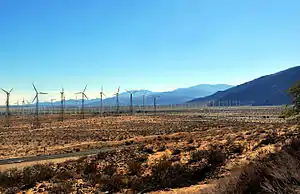Low Desert
The Low Desert (sometimes informally known as the Desert) is a common name for any desert in California that is under 2,000 feet (609.6 m) in altitude. These areas include, but are not exclusive to, the Colorado Desert and Yuha Desert, in the Southern California portion of the Sonoran Desert. These areas are distinguished in biogeography from the adjacent northern High Desert or Mojave Desert by latitude, elevation, animal life, climate, and native plant communities.[1][2]

Gateway to Palm Springs, California as seen from above California State Route 62 in the Sonoran Desert, California.
Communities
The cities and towns in the Low Desert include:
Parks
- Anza-Borrego Desert State Park
- Joshua Tree National Park – northern portion of Low Desert
- Salton Sea State Recreation Area
- Indio Hills Palms Park
- Santa Rosa and San Jacinto Mountains National Monument
- Big Morongo Canyon Preserve
Wildlife refuges and wilderness areas
- Coachella Valley National Wildlife Refuge
- Imperial National Wildlife Refuge
- Havasu National Wildlife Refuge
- Cibola National Wildlife Refuge
- Sonny Bono Salton Sea National Wildlife Refuge
- Fish Creek Mountains Wilderness
- Santa Rosa Wilderness
- Indian Pass Wilderness
- Whipple Mountains Wilderness
- Sawtooth Mountains Wilderness
- Little Picacho Wilderness
See also
- Category:Populated places in the Colorado Desert
- Category:Protected areas of the Colorado Desert
- Category:Wilderness areas within the Lower Colorado River Valley
- Category:Flora of the California desert regions
- Category:Mountain ranges of the Colorado Desert
References
Wikivoyage has a travel guide for California Desert.
- Deserts at California Natural Resources Agency web site Archived 2013-05-04 at the Wayback Machine
- "California Deserts 101: High Desert vs Low Desert". Sand-boarding.com. Retrieved 12 June 2023.
This article is issued from Wikipedia. The text is licensed under Creative Commons - Attribution - Sharealike. Additional terms may apply for the media files.
